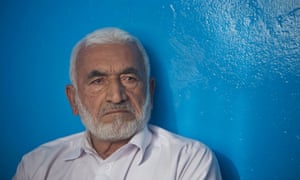Farkhunda murder: Afghan court quashes death sentences
Three of the men convicted for their part in beating woman to death in Kabul are instead given 20-year prison sentences, with a fourth jailed for 10 years
Mohammad Nader Malikzada, father of Farkhunda, a young Afghan woman who was beaten to death by a mob. Photograph: Massoud Hossaini/AP
An Afghan court has quashed the death sentences given to four men for their part in the murder of a woman lynched by a mob in the centre of Kabul.
The death of Farkhunda Malikzada, who was beaten and burned before being thrown in a river, shocked Afghans and prompted demonstrations urging the authorities to protect women from violence. She was attacked in March after being falsely accused of burning a copy of the Qur’an.
The appeals court judge, Abdul Nasir Murid, told the Associated Press on Thursday that three of the men convicted of the murder were instead given 20-year sentences, with a fourth jailed for 10 years.
The ruling was made in a closed-door hearing on Wednesday. It was first reported by the independent Tolo TV, which said the pedlar at the shrine who allegedly incited the mob was acquitted.
There was an angry reaction from Farkhunda’s family and civil society groups.
“It’s not a court, it’s just a show,” her brother told BBC Persian. “The media should have been there, we should been there, the lawyers should have been there.
“It’s a real theatre. The whole world laughs at the judicial system of Afghanistan. Do the judges have families, sisters, mothers – or not? Do they have a heart? We will not accept this decision.”
Around 3,000 people marched through the streets of Kabul after Farkhunda’s murder, according to protest organisers, who called it one of the biggest demonstrations in Kabul’s history. After Wednesday’s decision there were calls for fresh protests.
Ramin Anwari, a Kabul-based activist, said: “Not all but a group of civil society activists have been against the death penalty from day one, so that could be a welcome decision [to commute them] but the concerning issue is that the court has been behind closed doors and the discrepancy there is. Twenty years is not the equivalent to a death sentence. The equivalent is a life sentence.”
He said the pedlar at the shrine, who was reportedly acquitted, was “the person behind all those crimes taking place in the first place. It’s beyond shocking.”
Anwari said he would be meeting with other activists over the next couple of days to discuss how to register their protest, which could include street rallies. “We have to keep fighting,” he said.
On the same day in May that the four men were given the death penalty, the judge sentenced eight defendants to 16 years in prison and acquitted 18 others. Charges included assault, murder and encouraging violence. Public outrage prompted the government and court system to act quickly and concerns were expressed that the trial lasted just two days. Anwari said the entire case had been an embarrassment to the Afghan justice system, with those arrested forced to defend themselves without lawyers and handcuffed in court, which he said was unlawful.
Kimberley Motley, a US lawyer in Afghanistan who represented Farkhunda’s family at the first trial described the decision as “outrageous”. She said: “It shows that the judges are not interested in following the rule of law in Afghanistan. I think it’s horrendous that this case was conducted in private. The family were not told about it and afforded the right to be in court. It’s extremely disappointing that they would come up with this decision in such a secret way. It will be really interesting to see the written rationale.”
In all, 49 people stood trial. Eleven police officers were later sentenced to one year in prison for dereliction of duty in relation to Farkhunda’s death. Another eight officers were acquitted due to lack of evidence.

